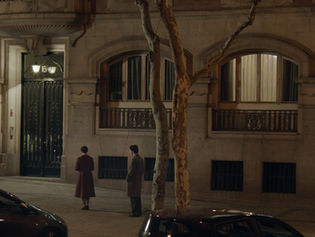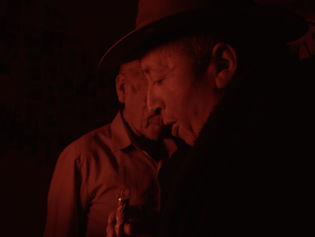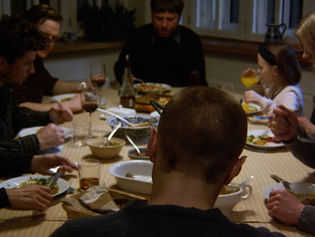AnafiFF 2024
The films

"The physical environment we live in" - Curated by Helene Stergiopoulou
What does nature mean to you nowadays?
When time is a luxury we can scarcely afford, it's all too easy to forget the tangible sensations of nature. Our daily narratives often revolve around anthropocentric concerns, political strife, industrial progress, and the unsettling specter of conflict and fake news. Amidst the cacophony of noise, information, cars, tweets, and updates, our connection to the natural world can feel tenuous, distancing us from nature's raw, unfiltered benefits.
Yet, there are moments and stories where nature asserts its primacy, reminding us of our place within the greater web of life. These narratives have the power to draw us out of our urban cocoons and reconnect us with something primal and essential within ourselves. They remind us that, despite our efforts to control and manipulate our environment, we are ultimately at the mercy of forces far greater than ourselves. In that recognition lies the potential for a deeper, more harmonious relationship with nature, sustaining both body and spirit.
"The Memory of Walls" - Curated by Maya Sfakianaki
What was the color of your childhood room, and do you still imagine life through these lenses?
Walls hold a vast repository of memories encapsulated within domestic or social environments, and simultaneously contribute to shaping history through their architectural presence. The class of their inhabitants is often dictated by the structures themselves, reflecting the social and economic hierarchies of different times and locales. The films in this curation listen to the stories of these walls, which carry a wealth of emotions and histories. The personal, intimate setting of a home is a space where memory is formed, but it also acts as a broader signifier of wealth, class and position within history and society. Thus, the individual experience is woven into the larger narrative, shaping the collective memory.
"Do you love your sweet little death?" - Curated by Stelios Christoforou
Is death happening in the past or in the future? An unconditional pleasure of ordering the biggest regret of your life.
Say goodnight now. To your true self. Dream away, dream about the past in a wave of addicted pleasure. Inside the womb.
A gaze of blame, full of truth, endless. Without a hint of reconnection.
Are sweaty bodies closer to death?
When you sweat, do you get rusty? When you get rusty do you sweat?
A wave of atonement,
not white.
Sleeping wide awake. Open eyes, open mouth. Being awake. Feeling asleep. Dreaming consciously. I miss us. I miss me. Let’s find out what happens now.
"Rituals of Sacred Sins" - Curated by Stavros Markoulakis
To rephrase David's words in Psalm 51.5 "We were brought forth in iniquity, and in sin did our mothers conceive us". In shapes of different lenses, with words that traverse times, places and realities, these four narratives set us on a journey to explore what followed that very first moment. How the rituals that survived in time, shape our understanding of sin, redemption, and the sacred. The mysterious, holy peaks of the Peruvian mountains, and the mystical feline gatherings in haunted deserted buildings, will set the tone. The stories of disobedience and ultimate devotion to the Divine, through ancestral ceremonials or innocent night rides, will further explore our relation to the forbidden across times in history. Despite our sinful nature, faith often emerges as a powerful force, guiding our actions and offering solace amidst the mysteries of existence, intertwining with the archetypes and the spirituality that define our collective consciousness.
"Things We Don't Talk About" - Curated by Antigoni Papantoni
Things we don’t talk about argues that words have the power to change our consciousness, which in turn not only can change our lives but also the continuity in the development of culture, for generations to come.
If we aren’t told about sexual consent when we are children, how does that set us up for abuse? If we don’t talk now about how we envision a society without war and discrimination, how will we reverse the nationalism and militarism rising again? If we don’t talk about our struggles with intimacy and mental health, how will we find the strength that derives from shared experiences?
When we can’t find the words, we are setting the ground for repetition of circles of abuse, trauma, violence and isolation. Female and non-binary filmmakers encourage us to use the magic sticks of introspection, language and vulnerability and we as audience are called to learn how to listen and how to get out of our comfort zone, word by word.
"Late Night Animation For Adults" - Curated by Maya Sfakianaki
From the deepest corners of the animators’ minds to our tired eyes late at night, these films come to captivate our imagination. They span from sharp political commentaries on contemporary aspirations for luxury goods to intimate portrayals of domesticity and daily life. They imagine and construct experimental dance pieces and immerse us in horrific military experiments. These peculiar and uncanny works employ a varied mix of animated styles and technologies to narrate stories that will crawl inside your head and make you fear getting into bed.
"No strings attached" - Curated by Ferdinand Waas
“(…) really to talk about your mental attitude and how do we cope psychologically, (…) the first thing to say is that we are all in conditions of high uncertainty and the human brain hates uncertainty. In fact it’s one of the most damaging states to be in as a human. Far more challenging to our health, mental and physical health than disappointment. Why ? Because our brains by chemistry is wired to have anticipation mechanisms. What that mean is that our hormonal and neural transmitter responses to make us feel good, feel pleasure, feel pain, feel fear are usually related to anticipation. And if we don’t know what’s gonna happen at the other end our human brain really hates it. (...)”
By Dr. Simon Marshall (2020)
Had a tough year
Using the word delusion a lot
I am delusional, that’s delusional, let’s be delusional
Other favourite phrase let’s see
Let’s see, let’s see, let’s see
Somewhere situated between those two moods
Delusional and let’s see
Actively denouncing hope and unpredictably hoping for optimisms
Guess this program got out of these moods
‘No strings attached’ as a phrase to mix up your vocabulary a bit but saying the same
These films gave me hope
Awaiting the summer breeze
Happy to be here with all of you


















































